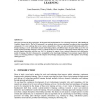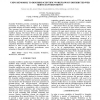303 search results - page 32 / 61 » Adaptive Collaboration in Peer-to-Peer Systems |
IADIS
2004
13 years 9 months ago
2004
This paper presents the design principles, development and implementation of an e-learning framework, called Intelligent Cognitive Agents (InCA). The InCA framework is an ontology...
HICSS
1995
IEEE
13 years 11 months ago
1995
IEEE
The complexity of group interaction means that there will be many uncertainties in the requirements for software support tools. Many existing software systems rely on the adaptabi...
IGARSS
2009
13 years 5 months ago
2009
Scientific Workflows provides a technology that facilitates researchers by allowing them to capture in a machine processable manner the method relating to some research. This incr...
PERCOM
2005
ACM
14 years 1 months ago
2005
ACM
Recent developments in pervasive computing have enabled new features for collaboration and instrumentation in educational technology systems. An infrastructure for the integration...
SDM
2009
SIAM
14 years 4 months ago
2009
SIAM
Complex systems exhibit emergent patterns of behavior at different levels of organization. Powerful network analysis methods, developed in physics and social sciences, have been s...


